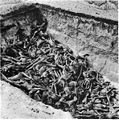Portal:Genocide
The Genocide PortalGenocide is violence that targets individuals because of their membership of a group and aims at the destruction of a people. Raphael Lemkin, who first coined the term, defined genocide as "the destruction of a nation or of an ethnic group" by means such as "the disintegration of [its] political and social institutions, of [its] culture, language, national feelings, religion, and [its] economic existence". During the struggle to ratify the Genocide Convention, powerful countries restricted Lemkin's definition to exclude their own actions from being classified as genocide, ultimately limiting it to any of five "acts committed with intent to destroy, in whole or in part, a national, ethnical, racial or religious group". Genocide has occurred throughout human history, even during prehistoric times, but is particularly likely in situations of imperial expansion and power consolidation. Therefore, it is usually associated with colonial empires and settler colonies, as well as with both world wars and repressive governments in the twentieth century. The colloquial understanding of genocide is heavily influenced by the Holocaust as its archetype and is conceived as innocent victims targeted for their ethnic identity rather than for any political reason. Genocide is widely considered to be the epitome of human evil and often referred to as the "crime of crimes"; consequently, events are often denounced as genocide. (Full article...) Selected articleDe-Cossackization (Russian: Расказачивание, romanized: Raskazachivaniye) was the Bolshevik policy of systematic repression against the Cossacks in the former Russian Empire between 1919 and 1933, especially the Don and Kuban Cossacks in Russia, aimed at the elimination of the Cossacks as a distinct collectivity by exterminating the Cossack elite, coercing all other Cossacks into compliance, and eliminating Cossack distinctness. Several scholars have categorised this as a form of genocide, whilst other historians have highly disputed this classification due to the contentious figures which range from "a few thousand to incredible claims of hundreds of thousands". The campaign began in March 1919 in response to growing Cossack insurgency. According to Nicolas Werth, one of the authors of The Black Book of Communism, Soviet leaders deciding to "eliminate, exterminate, and deport the population of a whole territory", which they had taken to calling the "Soviet Vendée". The process has been described by scholar Peter Holquist as part of a "ruthless" and "radical attempt to eliminate undesirable social groups" that showed the Soviet regime's "dedication to social engineering". Throughout this period, the policy underwent significant modifications, which resulted in the "normalization" of Cossacks as a component part of Soviet society. (Full article...) Selected biographyIsrael W. Charny (1931 – 14 December 2024) was an Israeli psychologist and genocide scholar. He is the editor of two-volume Encyclopedia of Genocide, and executive director of the Institute on the Holocaust and Genocide in Jerusalem. (Full article...) Quote
Related portalsSelected imagesDid you know...
Genocide listsInternational prosecution of genocide (ad hoc tribunals)It is commonly accepted that, at least since World War II, genocide has been illegal under customary international law as a peremptory norm, as well as under conventional international law. Acts of genocide are generally difficult to establish, for prosecution, since intent, demonstrating a chain of accountability, has to be established. International criminal courts and tribunals function primarily because the states involved are incapable or unwilling to prosecute crimes of this magnitude themselves. For more information see: International prosecution of genocide (International Criminal Court)To date all international prosecutions for genocide have been brought in specially convened international tribunals. Since 2002, the International Criminal Court can exercise its jurisdiction if national courts are unwilling or unable to investigate or prosecute genocide, thus being a "court of last resort," leaving the primary responsibility to exercise jurisdiction over alleged criminals to individual states. Due to the United States concerns over the ICC, the United States prefers to continue to use specially convened international tribunals for such investigations and potential prosecutions.[1] For more information see:
Genocide topicsGenocide Article Index
CategoriesThings you can do
Associated WikimediaThe following Wikimedia Foundation sister projects provide more on this subject:
Web resourcesExternal links
Discover Wikipedia using portals |
































